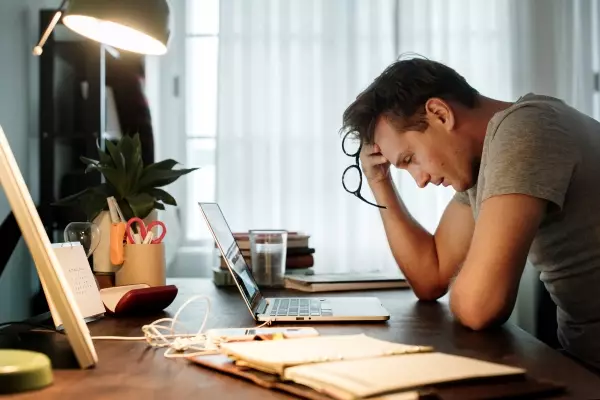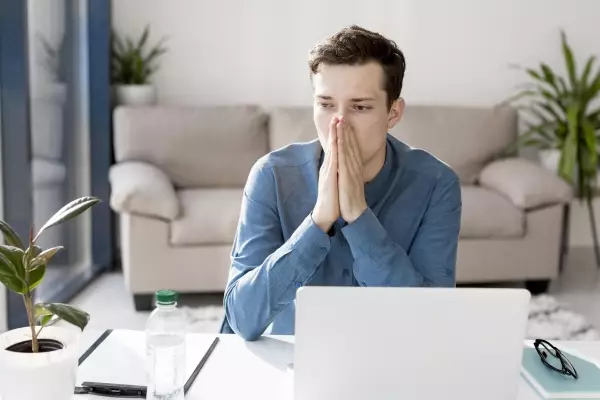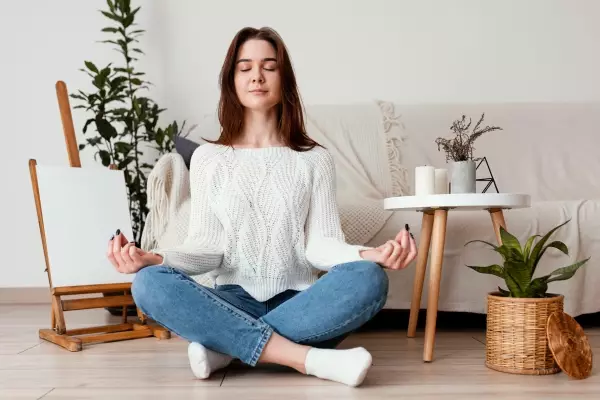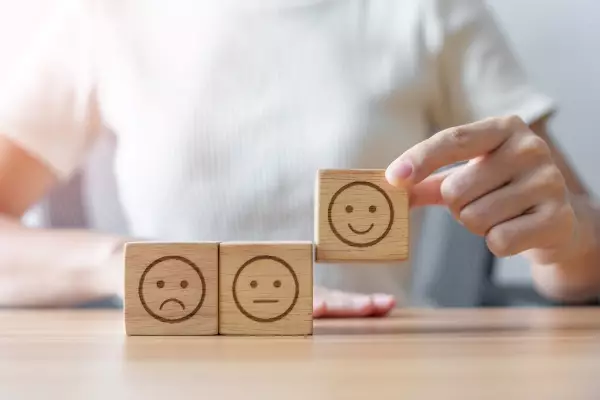Anxiety disorders are the most common mental health disorder in the U.S., affecting 40 million adults in the United States, age 18 and older, or 18% of the population. Anxiety disorders are highly treatable, yet only 36.9% of those suffering receive treatment.
It's no secret that stress and anxiety can affect our mental and physical health. They can lead to severe problems like depression, heart disease, and even substance abuse if left unchecked.
When you are under stress or anxiety, it’s natural for your mind to go into overdrive. Negative thoughts and feelings can become overwhelming, but the good news is that you have the power to manage these reactions.
Stress and anxiety are neutral experiences; they are neither good nor bad. How you respond to stress and anxiety at any given moment determines whether they will be positive or negative experiences. For many people, stress and anxiety are unavoidable.
You may have experienced one or both of these feelings at some point in your life due to a challenging situation at work, school, home, or even from something as simple as a test or an argument with a friend.
The trick is learning how to cope with stress and anxiety more effectively and in healthier ways so that they become positive experiences that challenge you rather than negative ones that debilitate you.
What Is Stress?
Stress is a natural and inevitable part of life that can help us respond to and deal with challenging situations. Stress is a response to a demand placed on the body, such as feeling pressured to complete a project or trying to solve a conflict with a loved one.
These everyday stressors are normal and can help us perform better at work, study better in school, or make better decisions in our personal lives. When the stress response is short-lasting and manageable, it can be helpful and positive.
Unfortunately, many people today are experiencing higher levels of stress than ever before. This increased stress can be attributed to various factors, including work pressures, financial concerns, relationship issues, and health concerns.
While some stress is normal and even healthy, it’s essential to reduce your stress levels so they don’t become harmful.
What Is Anxiety?
Anxiety is a feeling of worry, nervousness, or uneasiness caused by anticipation of future events. In other words, anxiety is a feeling of fear or apprehension about something that might happen in the future.
There are many types of anxiety; for example, you may experience anxiety about work, school, finances, relationships, health, or other issues. Specific environments or situations can also trigger anxiety. For example, you might feel anxious before taking a test, driving in heavy traffic, or attending a social event.
Generalized anxiety disorder (GAD) is a type of anxiety disorder characterized by excessive and persistent worry about various topics or issues. People with GAD may experience physical symptoms such as fatigue, tension headaches, muscle aches, difficulty sleeping, and more.
Anxiety is not always a bad thing. It can be beneficial, helping you to survive dangerous or stressful situations. But, when anxiety is constant and chronic, it can have a negative impact on your life.
Identifying The Root Cause Of Stress And Anxiety
If you feel stressed out and anxious often, it’s crucial to identify the source of your feelings. By doing so, you are more likely to find ways to reduce stress and anxiety levels.
The first step to dealing with stress and anxiety is identifying the source of these feelings. Ask yourself questions like: “What situation am I worried about?” or “What is causing me to feel anxious?”
Once you identify the source of your stress and anxiety, developing ways to reduce your feelings will be easier. There may be some situations you can’t change, but there are always ways to change your reaction to them.
It's important to remember that you have the power to change how you respond to any situation or stressful event. You have the power to change your perspective.
Strategies To Help You Manage Stress And Anxiety
Excessive anxiety and stress can have a negative impact on your physical and mental health.
Emotion-focused strategies involve changing how you think about and react to stressful situations. Here are some strategies you can try to help manage stress and anxious feelings:
Practice Mindfulness And Meditation
Mindfulness is being fully aware of your thoughts and feelings in the present moment without being judgmental about them. Practicing mindfulness makes it easier to let go of unnecessary stress and negative thoughts.
Some people find that meditation helps reduce stress and anxiety. Meditation is the practice of training your mind to focus on your breathing. When you meditate, you are allowing yourself to take a break from the everyday stresses of life.
Meditating can help you let go of negative emotions and thoughts and reduce your feelings of stress and anxiety. You can meditate by sitting in a quiet place with your eyes closed, focusing on your breathing. You can also meditate while doing an activity, like taking a walk or gardening.
Get Enough Sleep And Eat Healthily
Being well rested can help reduce stress and anxiety. Getting enough sleep can also improve your mood and help you make better decisions. Moreover, what you eat can have a significant impact on your mood. Eating healthy foods can help reduce your feelings of stress and anxiety.
This coping strategy is twofold: getting enough sleep and eating a healthy diet. When you’re well-rested, it’s easier to manage stress and anxiety. A healthy diet can also improve your mood and help reduce stress levels.
Limit Alcohol Intake And Avoid Drugs
Drinking alcohol and taking drugs may seem like they help reduce stress and anxiety in the short term, but they can make these problems worse in the long term. Alcohol is a depressant, and it can make anxiety and stress harder to deal with.
If you find yourself drinking or using drugs to cope with stress and anxiety, getting help is important. There are many resources available to help you deal with these problems in a healthy way.
Get Outside And Breathe
Spending time in nature can lower your levels of stress and anxiety. Getting outside for a walk or taking a hike is a great way to reduce the anxiety you feel from everyday life.
Taking time to slow down and breathe deeply can help reduce feelings of stress and anxiety. Deep breathing is proven to help lower stress and anxiety, as well as reduce feelings of depression.
To do deep breathing exercises, breathe in through your nose for a five-second count, hold your breath for a five-second count, and breathe out through your mouth for a five-second count.
Get Regular Exercise
Exercise releases endorphins, which have mood-boosting effects. It can also help to reduce stress and anxiety by improving sleep and increasing energy levels.
Exercising is one of the best ways to reduce stress and anxiety. Exercise has been shown to reduce stress hormones, which can help you feel less anxious. Exercise can also improve your sleep, reduce stress and mood, and help you be more resilient during stressful situations.
You can do many types of exercise, including yoga, running, weight lifting, and more. No matter what kind of exercise you do, it can help reduce your stress and anxiety.
Connect With Others
Too much stress and anxiety can lead to isolation and make you feel like you’re all alone. Connecting with others, whether family, friends, or a support group, is essential. Talking to others can help you feel less isolated and more connected.
Anxiety disorder can make you feel isolated and alone, but reaching out to family and friends can help you feel supported and connected. Talking to someone who understands what you're going through can also be helpful.
Spending time with friends and family can help reduce stress and promote positive emotions. If you're feeling isolated, try joining a support group or volunteering in your community.
Develop A Support Network
Having a support network of people who care about you and can understand what you are going through can help relieve your stress and anxiety. Support networks can help you feel less alone, decrease feelings of isolation, and make it easier to cope with challenging situations.
Whether it’s talking to a friend, joining a support group, or connecting with someone online, building a support network can help make life easier.
Make Time For Things You Enjoy
Doing things you enjoy, such as reading, listening to music, or spending time in nature, can help reduce stress and improve your overall well-being.
Coping strategies make all the difference in how we deal with stress and anxiety. By incorporating some of these coping mechanisms into our daily lives, we can help to reduce our stress levels and improve our overall mental health.
Seek Professional Help If Needed
If anxiety coping skills aren't providing relief, or if anxiety is significantly impacting your life, seek professional help. A therapist can help you identify and work through the issues causing stress and anxiety.
Talk to a mental health professional if your stress and anxiety are severe or interfering with your day-to-day life. They can help you develop a treatment plan that may include medication or therapy. A mental health provider can also help you identify the root cause of your anxiety and develop coping mechanisms to deal with it.
Assessments Are Available
Mental health assessments could be a big help in lessening stress and anxiety. Such tools are designed to screen for different types of mental health disorders, including anxiety disorders.
Anxiety assessments can help you identify your specific type of anxiety disorder and the severity of your symptoms. From there, you and your mental health provider can develop a treatment plan that may include medication, therapy, or both.
New Directions offer several different types of mental health assessments, which can be administered by a licensed mental health professional.
Wrapping Up
There are a variety of strategies that people have found helpful in managing their stress and anxiety. Try new strategies to see which ones are helpful for you. It’s important to be open to new ideas and experiment with different approaches until you find what works best.
Following these coping mechanisms can effectively manage your stress and anxiety levels. Everyone copes differently, so find what works best for you and stick with it. With time and effort, you can take control of your stress and anxiety and live a happier, healthier life.







